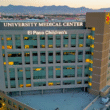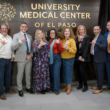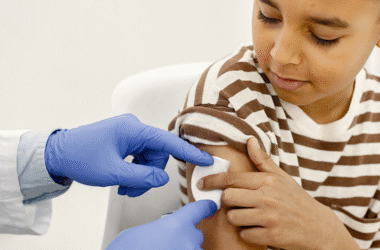November is Lung Cancer Awareness Month, a time to shine a spotlight on a disease that affects countless lives each year. At University Medical Center of El Paso, we believe awareness is the first step in reducing lung cancer’s impact. Understanding risks and taking preventive action can save lives and strengthen our community.
Why Does It Matter?
Lung cancer is among the leading causes of cancer-related deaths in the U.S., with an estimated 226,650 new cases and 124,730 deaths in 2025, according to the American Cancer Society. The World Health Organization reports that smoking is the main risk factor, responsible for about 85% of cases.
For our region around El Paso, taking action matters because earlier awareness, prevention, and screening can help reduce the toll this disease takes on individuals, families, and our healthcare system.
6 Simple Steps To Prevent It
1. Don’t smoke, or quit
Smoking is the main cause of lung cancer, and quitting at any age lowers risk. The U.S. Centers for Disease Control and Prevention emphasizes: “The most important thing you can do to prevent lung cancer is to not start smoking, or to quit if you smoke.”
2. Avoid exposure to second-hand smoke
Smoke from someone else’s cigarettes, pipes, or cigars increases risk: people exposed to second‐hand smoke have a 20–30% higher risk of lung cancer, according to the CDC.
3. Test for radon at home.
Radon is a naturally occurring gas that can seep into buildings through cracks in foundations. The CDC says radon is thought to be the second leading cause of lung cancer in the U.S., responsible for more than 20,000 lung cancer deaths each year.
4. Limit exposure to hazardous substances
This includes avoiding asbestos, diesel exhaust, certain industrial chemicals, and reducing air‑pollution exposure.
5. Screening for high-risk individuals
According to an American Lung Association survey, only 38% of U.S. adults were aware that lung cancer screening is available for high‑risk people. Early screening can improve outcomes.
6. Maintain healthy habits
While the direct evidence is strongest for the above risk factors, maintaining a healthy weight, staying physically active, eating a balanced diet, and avoiding undue exposure to pollutants also contribute to lung health.
We are committed to supporting our community in reducing the impact of lung cancer. By understanding the scale of the problem, recognizing the risk factors, and taking concrete steps to lessen those risks, each of us can play a part in making a difference.
It is important to monitor your health regularly to prevent, detect, and manage potential risks. At University Medical Center of El Paso (UMC), our health professionals are here to support your overall well-being. Call (915) 521-7979 today to schedule an appointment, or visit umcelpaso.org to learn more.










